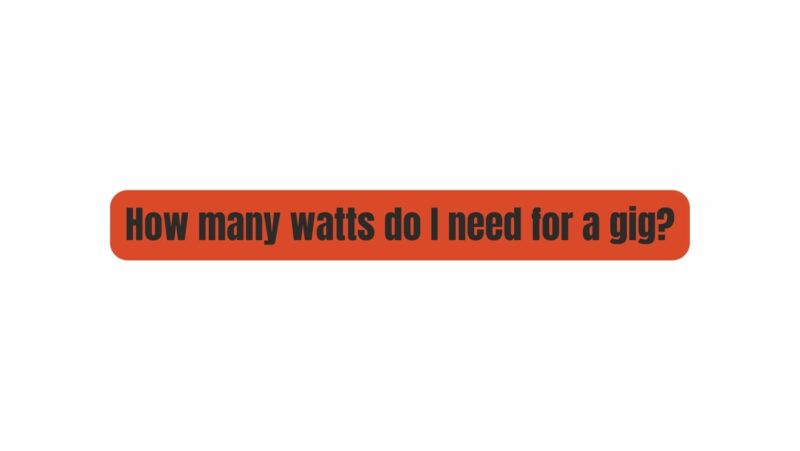Live music performances are a thrilling experience, whether you’re the one performing on stage or part of the audience. However, creating the perfect sonic atmosphere at a live gig requires careful planning, and one crucial aspect of that is determining how many watts you need for your sound system. In this comprehensive guide, we’ll delve into the intricacies of wattage calculations for different types of gigs, helping you achieve the ideal sound for your performance.
Understanding Watts and Their Importance:
Before we dive into the specifics, let’s establish a fundamental understanding of what watts are and why they matter in live music. In the context of audio equipment, a watt is a unit of power that determines how much energy an amplifier can deliver to your speakers. The right wattage ensures that your music reaches the audience with clarity and impact.
- Venue Size Matters:
The first consideration when determining your wattage requirements is the size of the venue. Larger venues demand more power to fill the space with sound. Here’s a general guideline:
a. Small Venues (Bars, Cafes, and Small Clubs): – For intimate settings, 50-200 watts per channel may suffice. – Consider a compact PA system or a powered speaker setup.
b. Medium-Sized Venues (Theaters, Halls, and Medium Clubs): – A range of 200-500 watts per channel is typically suitable. – Utilize powered speakers or mid-sized amplifiers.
c. Large Venues (Stadiums, Arenas, and Outdoor Festivals): – You’ll need 500 watts or more per channel for these massive spaces. – Professional-grade PA systems and powerful amplifiers are essential.
- Music Genre and Style:
The type of music you perform also influences your wattage needs. Different genres have varying demands on sound systems. For instance:
a. Rock and Metal: – These genres often require higher wattage due to their loud, aggressive nature. – Consider amplifiers with ample headroom to handle dynamic peaks.
b. Jazz and Acoustic: – A lower wattage setup can work well since these genres prioritize subtlety and clarity. – Choose equipment that reproduces nuances effectively.
c. Electronic and DJ Sets: – Electronica may require substantial bass response and power for electronic beats. – Subwoofers and powerful amplifiers can enhance the experience.
- Speaker Sensitivity and Efficiency:
The sensitivity rating of your speakers plays a crucial role in determining how many watts you need. Sensitivity is measured in decibels (dB) and represents how efficiently a speaker converts electrical power into sound. Speakers with higher sensitivity require less wattage to achieve the same volume level.
- Look for speakers with sensitivity ratings of 90 dB or higher to maximize efficiency.
- Pairing efficient speakers with lower wattage amplifiers can provide a cost-effective solution without compromising on sound quality.
- Multiple Speakers and Speaker Placement:
In many cases, using multiple speakers can distribute sound more evenly throughout the venue. However, this also affects your wattage calculations. When using multiple speakers:
- Consider the impedance of your speakers (measured in ohms) and how they are wired to your amplifier.
- Ensure proper speaker placement to avoid phase cancellation and achieve a balanced sound.
- Sound Reinforcement Needs:
Besides amplifying musical instruments and vocals, consider whether you need additional reinforcement for specific elements, such as:
- Drum kits: Drummers often require dedicated amplification to be heard clearly in larger venues.
- Monitors: Musicians on stage might need monitor speakers to hear themselves and their bandmates.
- Subwoofers: Low-frequency reinforcement can add depth to your sound, especially in bass-heavy genres.
- Budget Constraints:
While it’s important to invest in the right equipment for your needs, budget considerations are also crucial. Balancing your desired wattage with your available funds requires careful planning. Look for cost-effective solutions and consider whether renting equipment for larger gigs is a viable option.
Conclusion:
Determining how many watts you need for a gig involves several factors, including venue size, music genre, speaker efficiency, and your budget. It’s essential to strike the right balance to ensure your audience enjoys a memorable sonic experience. By considering these factors and conducting thorough research, you can confidently select the appropriate wattage for your live music performances, whether you’re playing in a cozy club or headlining a massive outdoor festival. Remember, achieving the perfect sound isn’t just about power; it’s about harnessing it effectively to create an unforgettable musical journey for your audience.

